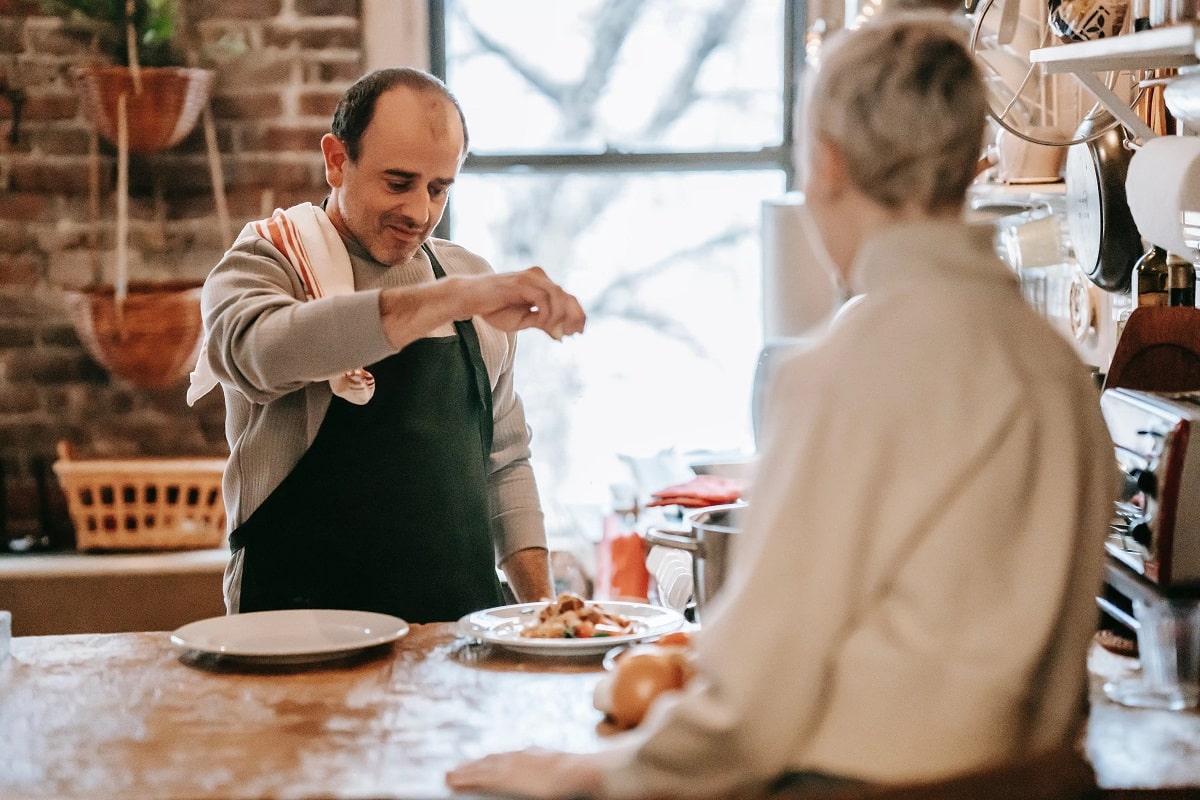Daily Routine in French: 76 Useful Words and Phrases

Mornings might not be your favorite part of the day, but they’re an essential start to any routine—and a good opportunity to boost your French vocabulary as a French learner.
Whether you’re a morning person or not, these expressions will help you navigate conversations about routine, from waking up to winding down.
Download: This blog post is available as a convenient and portable PDF that you can take anywhere. Click here to get a copy. (Download)
French Vocabulary for Waking Up
Wake up and smell the coffee! Seize the day!
| French | English | Example sentences |
|---|---|---|
| Les étirements | stretch | J'aime faire des étirements le matin. (I like doing stretches in the morning.) |
| La chambre | bedroom | Je range toujours ma chambre le matin. (I always tidy my room in the morning.) |
| Le lit | bed | J'ai un grand lit. (I have a big bed.) |
| Le réveil | alarm/the process of waking up | C'est dur le réveil ! (It's hard waking up!) |
| Sonner | to ring | Je suis comme tout le monde ; je n'aime pas quand le réveil sonne. (Like everyone, I don't like when my alarm clock rings.) |
| Avoir sommeil | to be sleepy | J'ai sommeil. (I am sleepy.) |
| Bâiller | to yawn | Jeanne bâille sans arrêt. (Jeanne is yawning nonstop.) |
| Se réveiller | to wake up | Ma fille Élise se réveille sans réveil. (My daughter Élise wakes up without an alarm clock.) |
| Se rendormir | to fall back asleep | Je me suis rendormi/rendormie ce matin et j'ai raté mon rendez-vous. (I fell asleep this morning and I missed my appointment.) |
| Se lever | to get up | Je me lève à 6 heures. (I wake up at 6 o'clock.) |
| Se lever du mauvais pied | to wake up on the wrong side of the bed (to be in a bad mood) | Alain s'est levé du mauvais pied. (Alain woke up on the wrong side of the bed.) |
| Tomber du lit | to wake up early (lit. "to fall from the bed") | Je suis tombé/tombée du lit beaucoup trop tôt pour réfléchir clairement. (I woke up too early to think clearly.) |
| La nuit blanche | sleepless night, all-nighter | J'ai passé une nuit blanche. (I had a sleepless night.) |
French Vocabulary for Getting Ready
Congratulations! You’ve gotten through the hardest part of the morning: waking up. Here are some useful words to talk about getting ready.
| French | English | Example sentences |
|---|---|---|
| La baignoire | bathtub | À mon avis, prendre un bain dans une baignoire n'est pas très écologique. (In my opinion, taking a bath in a bathtub is not very environment-friendly.) |
| La brosse à dents | toothbrush | J'ai une brosse à dents électrique. (I have an electric toothbrush.) |
| La dentifrice | toothpaste | J'utilise un dentifrice à la menthe. (I use a mint toothpaste.) |
| La douche | shower | J'ai pris une douche chaude. (I took a hot shower.) |
| Les chaussures | shoes | Je ne porte que des chaussures confortables. (I only wear comfortable shoes.) |
| Les fringues | clothes (used in more informal contexts) | Je n'ai pas beaucoup de fringues. (I do not have a lot of clothes.) |
| Les vêtements | clothes | En septembre, je commence généralement à porter mes vêtements d'hiver. (In September, I usually start wearing my winter clothes.) |
| Les informations | the news (often shortened to les infos.) | Ma radio préférée pour écouter les informations est France Inter. (My favorite radio (station) for listening to the news is France Inter.) |
| La salle de bains | bathroom* | La salle de bains est à côté de ma chambre. (The bathroom is next to my bedroom.) |
| Le lavabo | bathroom sink | Le lavabo est propre. (The bathroom sink is clean.) |
| Le miroir | mirror | Je me regarde dans le miroir. (I am looking at myself in the mirror.) |
| Le peigne | comb | J'oublie toujours mon peigne quand je voyage. (I always forget my comb when I am traveling.) |
| Le peignoir | bathrobe | J'enfile un peignoir à la sortie de la douche. (I put on a robe upon getting out of the shower.) |
| Le petit-déjeuner | breakfast | Pour le petit-déjeuner j'ai mangé une tartine grillée. (For breakfast I ate a piece of toast.) |
| Prendre le petit-déjeuner | to have breakfast | Il prend habituellement son petit-déjeuner à son bureau. (He usually has breakfast at his office.) |
| Boire | to drink | Boire du café le matin est non négociable. (Drinking coffee in the morning is non-negotiable.) |
| Être à l'heure | to be on time | La plupart du temps je suis à l'heure. (Most of the time I am on time.) |
| Être en avance | to be early | Je suis fier/fière de moi: je suis arrivé/arrivée en avance. (I am proud of myself; I arrived early.) |
| Faire son lit | to make one's bed | Chacun de mes enfants doit faire son lit. (Each of my kids must make their bed.) |
| Se brosser | to brush (one's teeth or one's hair) | Je me brosse les dents deux fois par jour. (I brush my teeth twice a day.) |
| Se depêcher | to hurry up | Il faut que je me dépêche. (I must hurry up.) |
| Se doucher | to shower | Je me douche et puis je prends un café. (I take a shower and then I drink a coffee.) |
| S'habiller | to get dressed | Mon mari s'habille très vite le matin. (My husband dresses quickly in the morning.) |
| Se laver | to wash (oneself) | Je me lave avec du savon biologique. (I wash with organic soap.) |
| Se peigner | to comb one's hair | Élise ne se peigne pas. (Élise does not comb her hair.) |
| Prendre | to take (both literally and figuratively)** | Je prends un petit-déjeuner léger. (I am having a light breakfast.) Je prends une douche tous les jours. (I take a shower every day.) |
| Se raser | to shave | L'homme se rase tous les matins avant de sortir. (The man shaves every morning before going out.) |
| Se maquiller | to put makeup on | La femme se maquille après avoir pris le petit-déjeuner. (The woman puts makeup on after having breakfast.) |
| Le maquillage | makeup | Ma mère m'a acheté du nouveau maquillage la semaine dernière quand elle est allée à Paris. (My mom bought me new makeup last week when she went to Paris.) |
*Especially in France, the salle de bains is often a separate room from les toilettes . The salle de bains is dedicated to washing up, whereas les toilettes have the sole function of being, well, the toilet room.
**Prendre is quite a versatile verb, much like faire (to do, to make) and is present in many idiomatic expressions.
French Vocabulary for Going to Work
During the week, many people commute to work, either on foot, by car or by other methods of transport. Here are some useful words and phrases to describe the morning commute.
| French | English | Example sentences |
|---|---|---|
| Aller au travail | to go to work | Quand le temps est mauvais, je vais au travail en bus. (When the weather is bad, I go to work by bus.) |
| Faire la navette | to commute | Je fais habituellement la navette avec mes collègues de travail. (I usually commute to work with my work colleagues.) |
| La route | the route | Il a dû trouver une route différente à cause de la neige. (He had to find a different route due to the snow.) |
| Les horaires (de bus) | (bus) timetable/schedule | Où puis-je trouver les horaires de bus ? (Where can I find the bus timetable?) |
| L'accident | accident | Tous les services de bus vers le centre-ville ont été annulés en raison d'un accident. (All of the bus services into the city center were canceled due to an accident.) |
| Les bouchons | traffic jam | Les infos ont annoncé 10km de bouchons sur l'autoroute. (The news announced 10km of traffic jams on the highway.) |
| L'embouteillage | traffic jam (used in formal contexts) | Il y a eu un très long embouteillage ce matin. (There was a very long traffic jam this morning.) |
| La circulation | traffic flow | La circulation est mauvaise. (The traffic flow is bad.) |
| La déviation | detour | J'ai dû prendre une déviation ce matin. (I had to take a detour this morning.) |
| Le temps peu clément | inclement weather | Je suis arrivé/arrivée en retard à cause du temps peu clément. (I arrived late because of the inclement weather.) |
| Les travaux [routiers] | road work, road construction | Ils font des travaux sur ma route habituelle. (They are doing road construction on my normal route.) |
| Être en retard | to be late | Marie est en retard. (Marie is late.) |
| Patienter | to wait patiently | Le train va redémarrer dans quelques instants ; veuillez patienter. (The train will restart in a few moments; please be patient.) |
| Ralentir | to slow down | La circulation est ralentie sur l'autoroute. (Traffic on the highway is slowed down.) |
| Tomber en panne | to break down | Ma voiture est tombée en panne. (My car broke down.) |
French Vocabulary for the Evening
Below, you’ll find some important vocabulary and verbs related to the evening in French. Remember that a lot of the terms listed under the morning table in this post will also be used when talking about the evening.
| French | English | Example sentences |
|---|---|---|
| Rentrer à la maison | to go home | Après avoir terminé le travail, je rentre à la maison pour dîner avant d'aller à mon cours de français du soir. (After finishing work, I go home to have dinner before going to my evening French class.) |
| Faire de l'exercice | to exercise | J'essaie de faire de l'exercice quatre à cinq fois par semaine. (I try to exercise four to five times a week.) |
| Se détendre | to relax | Je trouve plus facile de me détendre à la fin de la journée si je lis ou écris dans mon journal. (I find it easier to relax at the end of the day if I read or write in my journal.) |
| Une série/Un film | TV show/movie | Parfois, il m'est difficile de choisir entre regarder une série ou un film. (Sometimes I find it hard to choose between watching a TV show or a movie.) |
| Le livre | book | Cette année, l'un de mes objectifs est de lire plus de livres. (This year, one of my goals is to read more books.) |
| Sortir dîner | to go out for dinner | Préfères-tu sortir dîner ou manger chez toi ? (Do you prefer to go out for dinner or eat at home?) |
| Commander à emporter | to order takeout | Devrais-je cuisiner le dîner ou commander à emporter ce soir ? (Should I cook dinner or order takeout tonight?) |
| Cuisiner | to cook | Pierre cuisine toujours le dîner pour sa famille. (Pierre always cooks dinner for his family.) |
| Dîner | to have dinner | Mon mari et moi avons décidé de dîner dans un nouveau restaurant. (My husband and I decided to have dinner at a new restaurant.) |
| Le dîner | dinner | Charlotte a retrouvé ses amis de l'université pour dîner. (Charlotte met her friends from university for dinner.) |
| Le dessert | dessert | Mon dessert préféré est la crème brûlée. (My favorite dessert is crème brûlée.) |
| Aller au lit | to go to bed | Mon fils de 6 ans va au lit généralement à 20 heures. (My 6 year old son usually goes to bed at 8 p.m.) |
French Vocabulary for Your Weekend Routine
T.G.I.F.! Weekend mornings are great for sleeping in and, of course, reviewing French grammatical structures. Walk right this way, please.
| French | English | Example sentences |
|---|---|---|
| La gueule de bois | hangover | J'ai fait la fête hier soir et j'ai la gueule de bois. (I partied last night and I have a hangover.) |
| Bruncher | to have brunch | Le dimanche je brunche avec Carole. (On Sundays, I have brunch with Carole.) |
| Faire la grasse-matinée | to sleep in | Le samedi je fais la grasse-matinée. (I sleep in on Saturdays.) |
| Faire les courses | to do the grocery shopping | Je préfère faire les courses le week-end et acheter tout ce dont j'ai besoin pour la semaine à venir. (I prefer to do the grocery shopping at the weekend and buy everything I need for the week ahead.) |
| Nettoyer la maison | to clean the house | Les dimanches après-midi, je nettoie la maison et j'étudie le français. (On Sunday afternoons, I clean the house and study French.) |
| Passer du temps en famille | to spend time with family | J'attends toujours avec impatience de passer du temps avec ma famille le week-end. (I always look forward to spending time with my family on the weekend.) |
| Passer du temps avec des amis | to spend time with friends | Il retourne généralement dans sa ville natale pour passer du temps avec ses amis le week-end. (He usually travels back to his hometown to spend time with his friends on the weekend.) |
How to Practice Daily Routine Vocabulary in French
If you want to practice these terms, using flashcards can help you study more efficiently.
For example, you could use an app like Quizlet to create fun flashcards, or you could always go old-school and create some flashcards by hand!
With an immersion program like FluentU, you can also hear some of these terms used in context by native speakers.
FluentU takes authentic videos—like music videos, movie trailers, news and inspiring talks—and turns them into personalized language learning lessons.
You can try FluentU for free for 2 weeks. Check out the website or download the iOS app or Android app.
P.S. Click here to take advantage of our current sale! (Expires at the end of this month.)
To get an idea of how FluentU works, check out this video. It’s a French-dubbed clip from an episode of “The Simpsons,” and the host uses it to break down meaningful vocabulary, grammar, expressions and cultural context:
There you have it!
Regardless of what day of the week it is, you’ll be able to talk (or complain) about it.
Download: This blog post is available as a convenient and portable PDF that you can take anywhere. Click here to get a copy. (Download)
And one more thing...
If you like learning French vocabulary on your own time and from the comfort of your smart device, then I'd be remiss to not tell you about FluentU.
Other sites use scripted content. FluentU uses a natural approach that helps you ease into the French language and culture over time. You’ll learn French as it’s actually spoken by real people.
FluentU has a wide variety of great content, like interviews and web series, as you can see here:

FluentU brings native videos within reach with interactive subtitles.
You can tap on any word to look it up instantly. Every definition has examples that have been written to help you understand how the word is used.

For example, if you tap on the word "crois," you'll see this:

Practice and reinforce all the vocabulary you've learned in a given video with FluentU's adaptive quizzes. Swipe left or right to see more examples for the word you’re learning and play the mini-games found in the dynamic flashcards, like "fill in the blank."

As you study, FluentU tracks the vocabulary that you’re learning and uses this information to give you a 100% personalized experience.
It gives you extra practice with difficult words—and reminds you when it’s time to review what you’ve learned.
Start using the FluentU website on your computer or tablet or, better yet, download the FluentU app from the iTunes or Google Play store. Click here to take advantage of our current sale! (Expires at the end of this month.)













